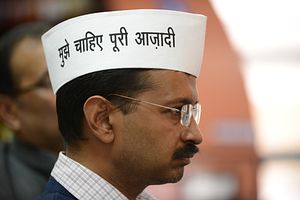In a game of tennis, if you lose your serve at a crucial juncture, it becomes particularly difficult to bounce back when the opponent is strong and leading the set. The task becomes all the more daunting if the audience is also not so encouraging. Not long ago, Arvind Kejriwal of the Aam Aadmi Party (AAP, or Common Man’s Party) was serving all aces and holding the court unchallenged. He captured power in Delhi within a year of forming the party, riding on a wave of the anti-corruption movement that he and his team organized against the outgoing Congress government. His agitational campaign galvanized the entire nation and unleashed a new political energy that electrified all of India.
But politics, like tennis, is all about nerves. Within two months — 49 days to be precise — Kejriwal resigned as the Chief Minister of Delhi, citing the lack of cooperation from the Congress and Bharatiya Janata Party (BJP) in passing strong anti-corruption legislation in the regional assembly. The abrupt decision to quit earned the activist-turned-politician the sobriquet of an escapist. His political opponents alleged that the AAP leader could not run the government and that the party was unfit to rule.
The unexpected success of the AAP in the Delhi assembly elections in December 2013 sent the aspirations of the leadership soaring and they decided to test the waters in the other parts of the country and spread their wings. Analysts say that it was this expansionist zeal which led to the abrupt resignation of Kejriwal from the Chief Minister’s post.
In the parliamentary elections, the party fielded candidates for 434 out of the total 545 seats — more than the Congress or the BJP. It stretched beyond its means and suffered the consequences. In the end, it won just four seats in Punjab but lost very badly in Delhi, the very state which catapulted the organization to the forefront of national consciousness. The BJP increased its vote share by 11 percent in the national capital, leaving the first runner-up in the December 2013 elections a distant second. The AAP lost all seven seats in the land of its birth. If one analyzes the parliamentary election results in Delhi, the Kejriwal-led organization does not stand to receive more than 10 seats out of 70 seats, a decline of 18 seats since December last year.
With a plummeting electoral graph and sharp erosion in its support base, existential questions have started troubling the once-trailblazing AAP. It is this existential crisis and desperation to remain afloat in the popular consciousness that made Kejriwal apologize for abdicating the throne of Delhi in just 49 days. He also expressed a desire to accept responsibility for Delhi again and wrote a letter in that direction to the Lieutenant Governor of Delhi, who is the constitutional head of the city state.
But the Congress Party has refused to extend any outside support to the AAP as it had done in December, thereby putting a lid on the AAP’s ambitions. Various newspapers report that the party’s legislators do not want to face elections, now fearing the loss of seats. It’s generally believed that if the elections are held for the Delhi Assembly now, the main beneficiary would be the BJP, riding on its success in the national elections. The AAP fears this as well.
It is in this political context that one must examine Kejriwal’s arrest. The activist-politician is facing a defamation case for leveling allegations of financial corruption against the BJP leader Nitin Gadkari. A lower court judge was willing to release the President of the AAP provided he furnished a bail amount of 10,000 rupees ($170 approximately), but he refused and the court had to sentenced him to two days of judicial custody. Kejriwal contends that he has not committed any crime and thus does not need to furnish bail. But the argument remains that at a time when the AAP’s stock is at an all time low, by refusing to seek bail the old master of agitational politics is indulging in his old gimmicks to draw the attention of the people of Delhi. Many analysts surmise that the anti-corruption party has already launched its election campaign for the Assembly through this incident.
However, Kejriwal forgets one basic fact: June 2014 is not December 2013. The political reality has undergone a dramatic shift and the mood of the nation has changed. The middle class, which was once enamoured of the 46 year old’s politics, has gotten disillusioned with him. At a time when a new government is about to take over the mantle of the nation, the AAP’s old political tactics have lost their traction. The party looks jaded. Kejriwal seems to have become the prisoner of his own politics.
He wants to speak the language of democratic politics without learning its grammar: the art of compromise and treading a middle path. He also needs to understand that emotion is not a substitute for the party’s structure.
It goes to the credit of the AAP for demolishing so many traditional political barriers and inspiring a new generation to join politics. It also goes to the credit of the fledgling outfit for unlocking the gates of power to the ordinary and common people of India. But the party really needs to evolve further and adjust its policies according to the changed circumstances in India. The anti-corruption slogan has lost much of its currency and it cannot be revived again.
A new era demands new ideas and new strategies. In the absence of these Kejriwal appears jaded and out of sync with the mood of the nation. To remain relevant in India’s politics, the AAP has to reinvent itself and think afresh.

































